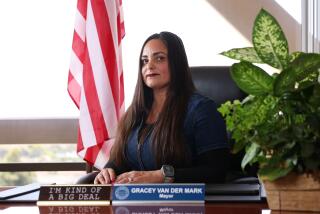Keeping Dossiers on Pregnant Teens Questioned
SAN FRANCISCO — State appeals court justices grilled an attorney general’s lawyer on Thursday as to why the state needs permanent dossiers on pregnant 13-year-olds, under a disputed requirement for doctors and others to report evidence of child abuse.
The 1st District Court of Appeal heard arguments on legal and constitutional challenges to Atty. Gen. John Van de Kamp’s legal interpretation of child abuse laws to require reporting of all pregnancies, abortions and venereal disease treatment involving children under 14.
Failure to make the required reports to authorities is a crime.
Family-planning groups, doctors and the American Civil Liberties Union contend that the requirements violate the children’s right to privacy and health care.
Research Possibilities
Deputy Atty. Gen. James Ching defended the reporting requirements, saying that even though criminal prosecution for voluntary conduct is unlikely, the reports can be used in research into the cause and prevention of child abuse.
Justice Zerne Haning appeared skeptical.
“The state is going to compile a dossier on young women who have become pregnant through their own consent . . . who have committed no crime . . . so that somebody someday can do research?” he asked.
The three-judge panel blocked enforcement of the reporting requirement last September for voluntary sexual conduct. They are scheduled to decide in 90 days whether the reporting is actually required by state law and, if so, whether it violates privacy rights.
A 1981 state law requires doctors, teachers and other professionals who work with children to tell local child-protection workers about suspected incidents of child abuse. The law defined child abuse to include “lewd conduct” with a child under 14, with or without consent.
Van de Kamp Opinion
Van de Kamp issued a formal opinion in June, 1984, saying the law required reporting of pregnancies, abortions and venereal disease treatment of children under 14, because these were indications that someone had violated the law against lewd conduct.
Attorney generals’ opinions have no force of law, but they are generally followed by state and local agencies until a court has ruled on an issue.
Lawyers for Planned Parenthood and several doctors said Thursday that the law should be interpreted to require reporting only in instances when a professional has reason to suspect “actual abuse” because of such things as force, coercion, or sexual activity with a very young child.
Violation of Privacy
American Civil Liberties Union lawyer Margaret Crosby said the reporting requirements violated minors’ privacy and actually undermined the protective goals of child abuse criminal laws by discouraging youths from seeking health care.
But Ching said state law defines any child under 14 who engages in sexual intercourse as a “victim of abuse.”
More to Read
Get the L.A. Times Politics newsletter
Deeply reported insights into legislation, politics and policy from Sacramento, Washington and beyond. In your inbox three times per week.
You may occasionally receive promotional content from the Los Angeles Times.










